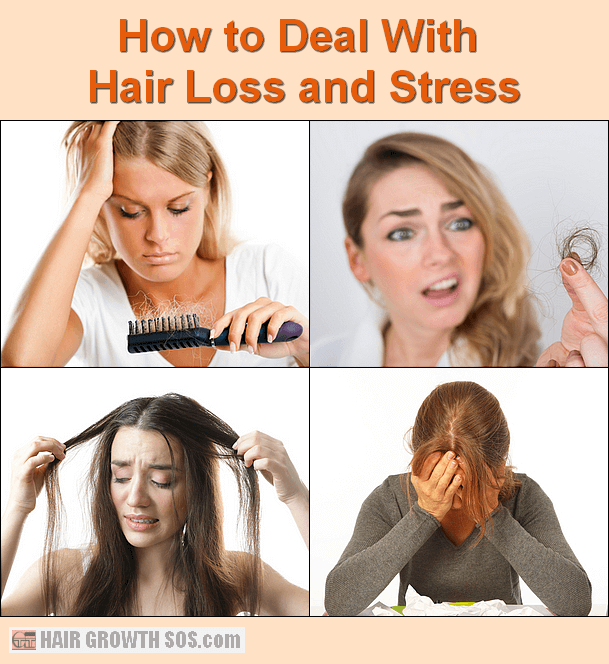- Home
- Causes of Hair Loss
- Stress
Hair Loss and Stress (And How to Deal With It)
By Paul Taylor

There is a definite link between hair loss and stress. Stress can make any hair disorder worse, and in some cases, even be the trigger that sets it off.
This article explains:
- Which types of hair loss have the strongest connection
with stress.
- How the stress mechanism works.
- What you
might be able to do about it.
The Most Common Type of Hair Loss
Androgenetic alopecia is the most common type of hair loss affecting both men and women. Stress can’t cause androgenetic alopecia, but it can make it worse.
I firmly believe this type of hair loss is caused by skull expansion (skull bone growth) in a process which increases scalp tension by progressively pulling tight the affected area of the scalp. This strains the capillary blood supply to
the hair follicles, restricting
their nutrient supply and causing the hair follicles to get smaller and
weaker. Hair loss then follows.
In
the stress response ("fight or flight" response), blood is diverted away from the extremities,
including the skin (which may turn your skin pale). The skin obviously includes the scalp, and the hair follicles it contains. And, as just explained, if scalp hair follicles
don’t receive enough nutrients from the blood supply, hair growth can start to suffer.
So it’s easy to see how this type of hair loss and stress can be connected.
However, this stress response is only temporary, which means that any negative effects it has, won’t last long. So, for that reason, stress can’t contribute to this type of hair loss to any great extent.
But there’s more to the stress response than simply diverting blood
away from your extremities. The effect that stress hormones have, and
how long it lasts, can vary from person to person.
Processing Stress Hormones

How efficiently you process stress hormones may have a part to play in the development of stress-related hair loss.
When stress hormones like cortisol and epinephrine (adrenaline) are released by your adrenal glands, they enter your bloodstream and start to take effect (the "fight or flight" response).
Eventually, your body will clear these hormones from your system. But how long this takes can vary from one person to the next depending upon a number of factors, one of which is blood type.
People with
blood type O appear less sensitive to stress than those with blood type A. Blood type A people initially respond to stress with higher stress hormone levels than those with blood type O, but then recover faster (1). Those with blood types B and AB lie in-between.*
* I believe that if studies were conducted to search for a possible correlation between stress-related hair loss conditions (such as alopecia areata below) and blood type, the results might prove very interesting.
Conditions Where Stress Can Trigger Hair Loss
In some disorders, hair loss and stress can be much more closely related - stress might actually be the trigger that sets it off. Such disorders include alopecia areata and acute telogen effluvium.
Alopecia areata
Alopecia areata causes bald spots and patches to appear very rapidly.
Someone with a history of areata can experience episodes of this disease that seem to coincide with stress. Areata can remain dormant for years. But, when extreme stress is experienced, it can quickly develop.
Alopecia areata might also be linked to other diseases and conditions (such as pregnancy) due to the high stress levels they can create.
Note: Alopecia totalis and alopecia universalis are related to alopecia areata and can also be connected to stress.
Learn more about alopecia areata, totalis and universalis.
Acute telogen effluvium
Sudden, heavy thinning throughout the scalp can occur following a sudden shock event (e.g., bereavement, a major accident, illness or surgery, etc). Any of these things could cause this condition.
There
is a delay (of approximately 3 months) before the hair loss starts
because it takes time for hair to start shedding once the follicles are
forced out of their growing phase and into their resting phase (2). And this
can make it difficult to link the hair loss and stress event together.
Learn more about telogen effluvium.
Another Hair Loss and Stress-Related Condition
Some disorders are not fully understood, so whether stress could be the actual trigger is unclear. One such condition is fibromyalgia.
Fibromyalgia
This condition has loads of symptoms and, quite possibly, loads of potential causes as well. Fibromyalgia is still something of a puzzle yet to be fully understood but there does seem to be a strong link with stress (3).
Learn more about Fibromyalgia.
How to Deal With Stress
More and more men and women are living today's fast paced "24-7" lifestyle.
The whole world, it seems, is getting faster!
And
with this hectic way of life comes an increase in stress. Physical,
chemical, and mental stress can all upset a body trying to maintain
balance. Here are just a few examples:
Chemical stress
- Environmental pollutants (city smog, exhaust fumes).
- Cigarette smoke.
- Deodorants, perfumes.
- Household cleaning products.
- A junk food diet.
Physical stress
- Not enough sleep - Do you get 8 hours every night?
- Occupation - Some jobs are much more physically demanding than others.
- Strenuous sport and exercise.*
* Physical
exercise is obviously healthy to some extent. But if you over exert
yourself or do vigorous exercise nearly every day, your body will be
placed under a lot of stress (and be at greater risk of injury too).
Mental and emotional stress
- Work pressure - Deadlines and responsibilities at work.
- Home life - Stressful relationships (perhaps the mother-in-law?)
- A combination - If juggling work and family commitments is a constant struggle, problems can fester in the mind and prolong your stress response.
Basically, too much of any type of stress is unnatural. And, this can spell bad news for your hair. Both male and female hair loss numbers are rising, and the day-to-day accumulation of stress in our lives is partly to blame.
However, the fact that you now know there can sometimes be a strong connection between hair loss and stress should mean that you can become aware of this the next time you experience stress.
So if you suffer hair loss and care about your hair, simply by being aware like this, might be enough to help you "rise above it all" and reduce, or even eliminate, any stress response you have.
And remember, some people
take longer to clear stress hormones from their system. So anything you
do which you find reduces your stress levels, is definitely worth continuing.
|
Like this page? |
|


